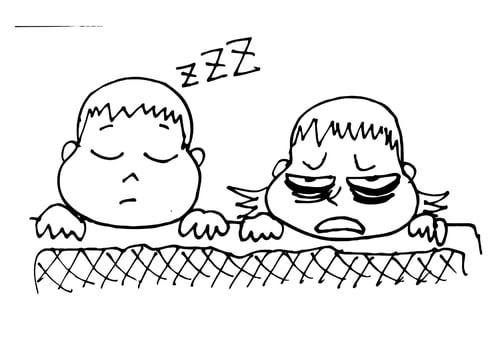The difference between softcore and hardcore insomnia
Self-proclaimed insomniacs should be asking themselves right now if they've got either a "softcore" or a "hardcore" sleep problem on their hands. What's the difference between softcore and hardcore insomnia and why is it important you ask? First, let's define the terms.
Softcore insomnia = complaint of insomnia with normal sleep duration greater than or equal to 6 hours of sleep
Hardcore insomnia = complaint of insomnia with less than or equal to 6 hours of sleep
Fernandez-Mendoza and colleagues from Penn State University College of Medicine grouped 678 participants from the general population using the aforementioned criteria (although without the sophisticated categorical nomenclature) to see what between-group differences in neuropsychological performance they would find. They controlled for age, race, gender, education, body mass index, and physical and mental health. The comprehensive neuropsychological battery included tests of processing speed, attention, visual memory, and verbal fluency.
The research team found no difference in performance between softcore insomniacs and controls. However, the hardcore insomniacs did worse on all tests compared to the controls and, get this, controls with less than 6 hours of sleep. Here it seems to be the case that it's only a problem if you make it one. "It's all about perception" as my former professor use to say. Can it be stress, anxiety, or depression combined with the lack of sleep that's leading to poorer performance? Further studies need to be done to tease this all apart.
The most significant finding was that hardcore insomniacs did the worst on tasks that required executive control of attention (set-switching).
If you're truly a hardcore insomniac, do yourself a favor and stay away from multi-tasking. For the rest of you softcore insomniacs, suck it up! At least you don't have real-life cognitive deficits.
References:
ulio Fernandez-Mendoza, MSc1,2,3; Susan Calhoun, PhD1; Edward O. Bixler, PhD1; Slobodanka Pejovic, MD1; Maria Karataraki, PsyD1; Duanping Liao, PhD4; Antonio Vela-Bueno, MD2; Maria J. Ramos-Platon, PhD3; Katherine A. Sauder, BA1; Alexandros N. Vgontzas, M (2010). Insomnia with Objective Short Sleep Duration is Associated with Deficits in Neuropsychological Performance: A General Population Study SLEEP, 33 (4), 459-465
Softcore insomnia = complaint of insomnia with normal sleep duration greater than or equal to 6 hours of sleep
Hardcore insomnia = complaint of insomnia with less than or equal to 6 hours of sleep
Fernandez-Mendoza and colleagues from Penn State University College of Medicine grouped 678 participants from the general population using the aforementioned criteria (although without the sophisticated categorical nomenclature) to see what between-group differences in neuropsychological performance they would find. They controlled for age, race, gender, education, body mass index, and physical and mental health. The comprehensive neuropsychological battery included tests of processing speed, attention, visual memory, and verbal fluency.
The research team found no difference in performance between softcore insomniacs and controls. However, the hardcore insomniacs did worse on all tests compared to the controls and, get this, controls with less than 6 hours of sleep. Here it seems to be the case that it's only a problem if you make it one. "It's all about perception" as my former professor use to say. Can it be stress, anxiety, or depression combined with the lack of sleep that's leading to poorer performance? Further studies need to be done to tease this all apart.
The most significant finding was that hardcore insomniacs did the worst on tasks that required executive control of attention (set-switching).
If you're truly a hardcore insomniac, do yourself a favor and stay away from multi-tasking. For the rest of you softcore insomniacs, suck it up! At least you don't have real-life cognitive deficits.
References:
ulio Fernandez-Mendoza, MSc1,2,3; Susan Calhoun, PhD1; Edward O. Bixler, PhD1; Slobodanka Pejovic, MD1; Maria Karataraki, PsyD1; Duanping Liao, PhD4; Antonio Vela-Bueno, MD2; Maria J. Ramos-Platon, PhD3; Katherine A. Sauder, BA1; Alexandros N. Vgontzas, M (2010). Insomnia with Objective Short Sleep Duration is Associated with Deficits in Neuropsychological Performance: A General Population Study SLEEP, 33 (4), 459-465
